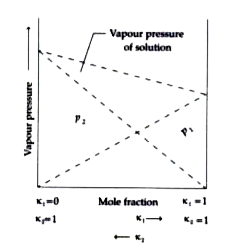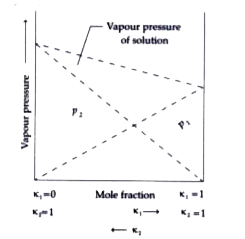Define Dalton's law of partial pressure.
Step-by-Step Solution:
1. Understanding the Concept: Dalton's Law of Partial Pressure is a principle in chemistry that applies to mixtures of gases. It explains how the total pressure of a gas mixture can be determined from the pressures of the individual gases present in the mixture.
2. Definition: Dalton's Law states that the total pressure (P_total) exerted by a mixture of non-reacting gases is equal to the sum of the partial pressures of each individual gas in the mixture.
3. Mathematical Representation: The law can be mathematically expressed as:
Ptotal=P1+P2+P3+...+Pn
where P1,P2,P3,...,Pn are the partial pressures of the individual gases in the mixture.
4. Example: For instance, if we have a mixture of oxygen (O2) and hydrogen (H2), and their partial pressures are PO2 and PH2, then according to Dalton's Law:
Ptotal=PO2+PH2
5. Conclusion: Dalton's Law of Partial Pressure is crucial for understanding how gases behave in mixtures and is widely used in various applications in chemistry and physics.
---
Ptotal=P1+P2+P3+...+Pn
where P1,P2,P3,...,Pn are the partial pressures of the individual gases in the mixture.
Ptotal=PO2+PH2
Topper's Solved these Questions
- STATES OF MATTER : GASES AND LIQUIDSBOOK - MODERN PUBLICATIONCHAPTER - STATES OF MATTER : GASES AND LIQUIDSEXERCISE - COMPETITION FILE OBJECTIVE TYPE QUESTIONS (D. MULTIPLE CHOICE QUESTIONS)(Integer Type Questions)
9 Videos
- SOME BASIC CONCEPTS OF CHEMISTRY BOOK - MODERN PUBLICATIONCHAPTER - SOME BASIC CONCEPTS OF CHEMISTRY EXERCISE - COMPETITION FILE (INTEGER TYPE AND NUMERICAL VALUE TYPE QUESTIONS)
10 Videos
- STRUCTURE OF ATOMBOOK - MODERN PUBLICATIONCHAPTER - STRUCTURE OF ATOMEXERCISE - Unit Practice Test
13 Videos
Similar Questions
Knowledge Check
To which of the following Dalton's law of partial pressure is not applicable ?
ASO2 and NO2 at room temperatureBN2 and H2 at room temperatureCSO2 and O2 at room temperatureDHCl and NH3 at room temperatureTo which of the following gaseous mixture, the Dalton's law of partial pressures will not apply ?
AHydrogen and carbon dioxideBHydrogen and nitrogenCNitric oxide and oxygenDOxygen and nitrogen.To which of the following mixture Dalton's law of partial pressure is not applicable ?
ACO and CO2BCO2 and N2CCH4 and C2H6DHCl and NH3
State (i) Charles's law (ii) Dalton's law of partial pressures.
View SolutionWhich among the following is the correct mathematical representation of Dalton's law of partial pressures?
View SolutionAssertion: If H2 and Cl enclosed separately in the same vessel exert pressure of 100 and 200mm respectively, their mixture in the same vessel at the same temperature will exert a pressure of 300mm
Reason: Dalton's law of partial pressures states that total pressure is the sum of partial pressures.
View SolutionRead the passage given below and answer the following questions :
Raoult's law states that for a solution of volatile liquids, the partial vapour pressure of each component of the solution is directly proportional to its mole fraction present in solution. Dalton's law of partial pressure states that the total pressure Ptotal over the solution phase in the container will be the sum of the partial pressures of the components of the solution and is given as:
Ptotal= P1+ P2

What type of deviation from Raoult's law does the above graph represent ?
View SolutionRead the passage given below and answer the following questions :
Raoult's law states that for a solution of volatile liquids, the partial vapour pressure of each component of the solution is directly proportional to its mole fraction present in solution. Dalton's law of partial pressure states that the total pressure Ptotal over the solution phase in the container will be the sum of the partial pressures of the components of the solution and is given as:
Ptotal= P1+ P2

Which of the following aqueous solutions should have the highest boiling point ?
View Solution
